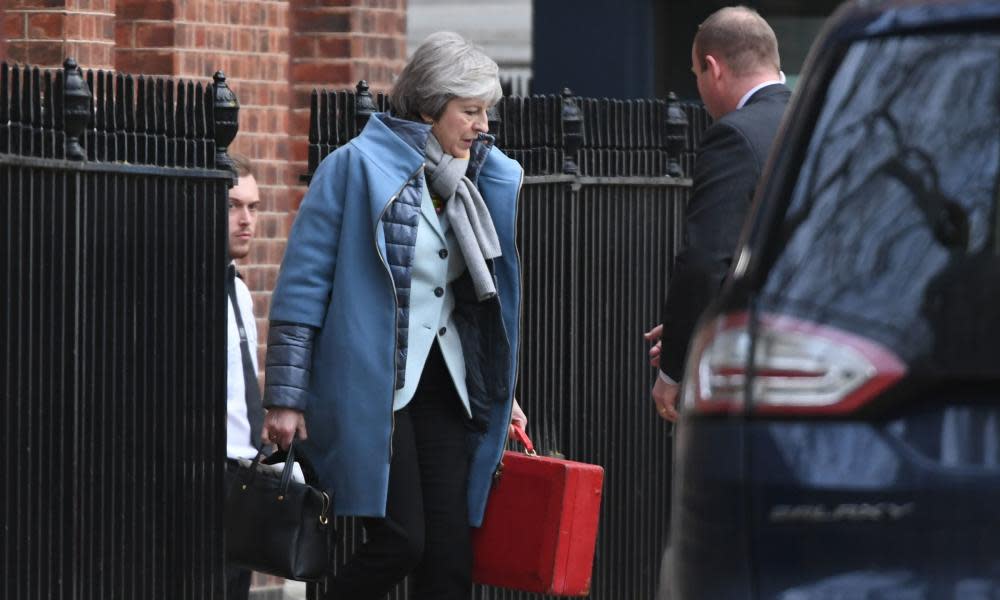Theresa May appeasing hard-Brexit Tories, ministers warn

Soft-Brexit cabinet ministers fear that Theresa May is determined to appease hardline leavers rather than reach out across the House of Commons, after key figures were excluded from discussions with other ministers.
May spoke to senior figures including the home secretary, Sajid Javid, the foreign secretary, Jeremy Hunt, the attorney general, Geoffrey Cox, the leader of the Commons, Andrea Leadsom, the environment secretary, Michael Gove, and the international development secretary, Penny Mordaunt.
Ministers who have urged a more flexible route, such as the chancellor, Philip Hammond, and the work and pensions secretary, Amber Rudd, the justice secretary, David Gauke, and the business secretary, Greg Clark, were not at either of the two lunchtime meetings on Friday. However, government sources suggested this may have been down to logistics.
Gauke has previously said the government should not be “boxed in” when it explores new ways to get a Brexit deal through parliament. Rudd has also said there should be “everything on the table because the priority is to find a negotiated settlement”.
Downing Street said the prime minister wanted to update cabinet ministers about her talks with MPs, which included her allies in the Democratic Unionist party, and senior Brexiters such as Iain Duncan Smith, Owen Paterson and Steve Baker, who are members of the European Research Group (ERG).
One cabinet source questioned why May was prioritising the views of those who had done so much to damage her.
“The ERG spent two years conjuring up every violent image they could think of in order to discredit the PM,” the source said. “Then they tried to bring her down. And then when that failed, they tossed her carefully crafted Brexit plan in the bin. Remind me why we are inching towards this mob?”
Those in attendance said they had been reassured May was not seeking to find a customs union compromise arrangement in order to get the deal through parliament.
Cabinet sources said ministers at the Friday meetings had pressed the PM for reassurance that her public statements rejecting any movement on a customs union or a referendum reflected what was being said in private.
“It was a classic ‘listening mode’ meeting which did not take us much further, but there were reassurances that a customs union and a second referendum are not the direction this is going in,” one said. “As to what the next steps are, we are none the wiser.”
Another cabinet source said May was urged not to pursue a route that could see a Tory split. “The only way forward that doesn’t split the party is to bring the DUP and the ERG on board,” the source said.
It is understood that the international trade secretary Liam Fox, a committed Brexiter, will make the government’s case on BBC One’s Andrew Marr Show on Sunday, which a cabinet source suggested was intended to send a signal to the ERG about May’s priorities.
Mordaunt put down a marker before the meeting, suggesting that leaving the EU without a deal would outweigh the benefits of staying in the EU.
“It’s only when ‘no deal is better than a bad deal’ is believed by the EU that we’ll maximise our chances of a deal,” she tweeted.
May will spend the weekend making more calls from her Chequers retreat to ministers and world leaders on how to break the current impasse.
On Thursday night and on Friday morning, she took calls from European leaders including the German chancellor, Angela Merkel, the Dutch prime minister, Mark Rutte, and the EU leaders Jean-Claude Juncker and Donald Tusk.
In her call with Rutte, May insisted there would be no delay to the UK’s departure from the EU on 29 March, while he in turn said the withdrawal agreement would not be “tweaked” to help her get the deal through parliament.
“She is really expecting Brexit to go ahead on 29 March,” Rutte told his weekly press conference, adding that he was concerned about the lack of time to avoid a no-deal scenario.
“It will cause disruptions and we are trying to minimise those,” he said. “We need to look at the facts and prepare for all scenarios. Hope for the best and prepare for the worst … time is running out. 29 March is only 10 weeks away.”
Luxembourg’s prime minister, Xavier Bettel, said May had promised to keep him abreast of her efforts to find a way through parliament during a recent call. “The pressure is on London to tell us what they want,” he said.
Juncker, who has been in text contact with May since the loss of the vote on Tuesday, would only say there had been “exchange of information”.
May will return to the Commons on Monday to make a statement to MPs and lay a motion for a vote on 29 January, when MPs are expected to make a number of attempts to halt the default march towards no deal in the absence of an agreed settlement in the Commons.
The former Tory minister Nick Boles and Labour’s Yvette Cooper will present a tweaked version of their bill, which would force the government to delay the UK’s departure from the EU unless a consensus could be found by early March.
That would in effect make it impossible for the government to legally leave the EU without a deal on 29 March.
The bill, initially proposed by Boles, has been resubmitted to remove a controversial clause which had suggested parliament’s liaison committee, made up of the chairs of departmental select committees, should take a formal role in assessing a consensus Brexit plan, which members of the committee said they did not want. Cooper will lay a new version of the bill on Monday.
The bill has significant private support from a number of ministers, the Guardian understands, with several suggesting that they could resign if the government does not allow a free vote on it.

 Yahoo News
Yahoo News 
